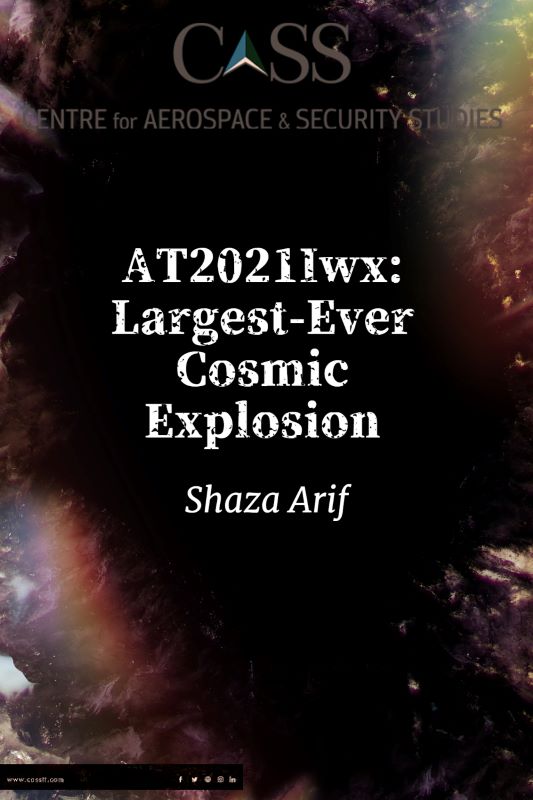The exploration of space has perpetually captivated human curiosity, as evidenced by the enduring fascination of ancient civilisations such as the Egyptians, Greeks, Chinese, and Islamic societies, have had about this realm. With time, the importance of space has grown given that it has led to profound technological advancements and groundbreaking discoveries. The revelation of black holes, exoplanets and dark matter is a testament to the intricate layers of complexities that exist in the vast frontier and the quest of human beings to push the boundaries of their knowledge.
Last week, astronomers reported the detection of the loudest cosmic explosion to have occurred in deep space. This news has sparked significant interest and ignited fresh debates within the space community. The explosion was initially observed by the Zwicky Transient Facility in California in 2020 and subsequently detected by the Asteroid Terrestrial-impact Last Alert System (ATLAS) located in Hawaii. The explosion has been designated as AT2021Iwx.
AT2021Iwx is reported to have been ten times more luminous than a supernova and approximately 100 times larger than our solar system. Within a three-year span, it unleashed an energy output equivalent to what the sun would emit over its entire 10-billion-year lifespan. Through the analysis of various light wavelengths, it has been estimated that this explosion took place roughly eight billion light years away, indicating that it occurred when the universe was six billion years old! This distance surpasses that of most other recent celestial luminous events, suggesting that the underlying explosion must have been inconceivably colossal in scale.
A similar explosion GRB 221009A was discovered last year but it was not comparable to the AT2021Iwx and it existed for a shorter period. The brightness of AT2021Iwx is assumed to have lasted for three years, which is relatively longer, given that the brightness of supernovas lasts only for a few months. The fact that it lasted for more than three years makes it a rare event that has puzzled scientists. Although AT2021Iwx was first detected in 2020, the scale of the explosion remained unknown till now. It was recently flagged by a search algorithm when scientists were searching for a particular type of supernova.
Astronomers are currently investigating potential explanations for this remarkable event. One possibility under consideration is that AT2021lwx originated from an exploding star. However, the extraordinary brightness of the flash surpasses that of any previously observed supernova, casting doubt on this hypothesis. Additionally, the concept of tidal disruption, which entails the disintegration of a star as it is consumed by a black hole, has also been discounted due to the explosion’s threefold greater luminosity compared to such occurrences. A research team at the University of Southampton has proposed that the blast was caused when a large gas cloud was swallowed up by a black hole. Such an episode could send shockwaves across space and the superheated remnants of the cloud surrounding the black hole could form a giant doughnut-like shape. This explanation currently enjoys wide acceptance among the scientific community as the leading hypothesis behind AT2021lwx.
The event is a truly remarkable one in astronomy. It has drawn the interests of scientists and the public alike. Once more, this remarkable phenomenon serves as a poignant reminder of the boundless expanse and the inherent mystery and magic of space, ceaselessly astonishing us with discoveries that surpass the confines of our imagination. Indeed, one of the divine attributes of Allah is Al-Wasay (The Boundless). The vastness of space, with its incomprehensible size and complexity, serves as a tangible manifestation of this attribute and is a profound sign of Allah’s existence and power.
The development also suggests that like everything else, the universe is constantly evolving. As expressed by Iqbal in one of his couplets, the English translation of which is as follows:
“This Universe perhaps is still raw and incomplete:
‘Be and it becomes’ ever doth a voice repeat.”
The verse eloquently conveys the idea that this expansive existence, this life of ours, may yet be in a state of raw potential and incompleteness. The resounding voice of the Creator, continuously echoing with the command ‘Be and it becomes,’ resounds through the cosmic tapestry, suggesting a perpetual process of unfolding and transformation.
The recent discovery of AT2021Iwx not only offers valuable insights into the evolution of galaxies, but also serves as a missing piece of the puzzle that could shape future space exploration endeavors. The sheer magnitude and unprecedented characteristics of this cosmic event will undoubtedly compel scientists to reassess existing knowledge and expand the horizons of future investigations. Furthermore, the occurrence raises the intriguing possibility that similar explosive phenomena await our discovery, promising further revelations and deeper understanding. The event will also help us better comprehend the relationship between black holes, evolution of galaxies and other complex elements of deep space from new angles.
It is apparent that regardless of the rapid technological advancements and innovations, there will always be something new on the horizon vis-à-vis space. It serves as a humbling reminder that there are countless secrets of the cosmos awaiting our unraveling, underscoring the perpetual allure and infinite depths of space that surrounds us.
Shaza Arif is a Research Assistant at the Centre for Aerospace & Security Studies (CASS), Islamabad, Pakistan. She can be reached at: cass.thinkers@casstt.com
Design Credit: Mysha Dua Salman




